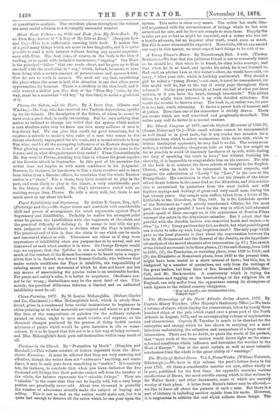The Church Congress of 1877, and the Oxford Movement of
1828-78. (James Nisbet and Co.)—This small volume cannot be recommended as well timed or in good taste, but if any reader has occasion for a repertoire from which to select acrimonious little darts with which to irritate theological opponents, he may find it ussfal. The anonymous author, a retired country clergyman, tells us that "he has sought as far as possible to avoid all unseemly harshness of spoech, while feeling the duty of speaking the truth in love ;" but without doubting his sincerity, it is impossible to congratulate him on his success. The aim of the book is to contrast the three schools of thought in the English Church, which he holds to be misnamed in several respects, and suggests the substitution of " Lowly " for "Low," in the case of the Evangelicals. His conclusion is that he and his friends of the latter school do not believe in the same God as the Ritualists, and this conclu- sion is maintained by quotations from the most foolish and wild fugitive sayings and writings of groat and very small men, daring the last twenty years. One sample may suffice, taken from a letter of Dr. Littledale to the Guardian, in May, 1868. In it Dr. Littledalo speaks of the Reformers as " such utterly unredeemed villains, for the most part, that the only parallel I know for the way in which half-educated people speak of them amongst us, is the appearance of Pontius Pilate amongst the saints in the Abyssinian calendar. But I admit that the parallel with the Jacobin leaders was somewhat harsh and unjust,—to them." (p. 149.) Crazy partisanship this, no doubt, but what possible good can it servo to rake up such long-forgotten trash ? The only page which gave us the least pleasure is that about the conversation between the late Mr. H. Drummond and the General of the Jesuits, on the hypotheti- cal analysis of the sacred elements after consecration. (p. 47.) The sketch of the Oxford movement in its three phases, (1) the anti-Roman, from 1828 to 1839; (2), the Tractarian, or wavering phase, from 1839 to 1850; and (3), the Ritualistic or Romeward phase, from 1850 to the present time, might have been useful as a short manual of facts ; but this, too, is disfigured by a number of quotations, not only from the writings of the great leaders, but from those of Dm. Bennett and Littledale, Mae- Coll, and Mr. Mackonochie. A controversy which is trying the foundations and tugging at the heart-strings of the religious life of England, can only suffer from the appearance among its champions of such figures as the retired country clergyman.
Non tali auxin% nee dofensoribus Tempue eget."


































 Previous page
Previous page